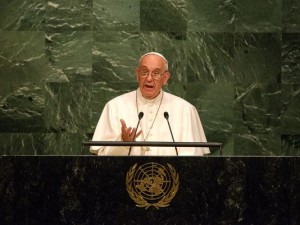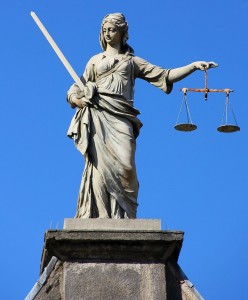In his address to the United Nations, Pope Francis I stated:
“Justice is an essential condition for achieving the ideal of universal fraternity. In this context, it is helpful to recall that the limitation of power is an idea implicit in the concept of law itself.
“To give to each his own, to cite the classic definition of justice, means that no human individual or group can consider itself absolute, permitted to bypass the dignity and the rights of other individuals or their social groupings.
“The effective distribution of power (political, economic, defense-related, technological, etc.) among a plurality of subjects, and the creation of a juridical system for regulating claims and interests, are one concrete way of limiting power.” (1)
“The limitation of power is an idea implicit in the concept of law itself.” The limitation of one person’s power, words and deeds is implicit as well in the concept of human rights. The enactment of human-rights laws proceeds by the restriction of the scope of action of one group for the enhancement of the scope of action of another.
So freedom of religion proceeds by the restriction of the rights of one group to stage a kristallnacht, (2) to deface a synagogue, to utter hate literature, or to harm those who wear clothing signifying their religious choices – turbans, yarmulkas, scarves, etc.
All of us submit to the rule of law, which restricts our words and deeds so as to guarantee the equality and freedom of others.
The basis of justice, as I learned by making human-rights decisions for the Immigration and Refugee Board of Canada (IRB), is fairness. We don’t need to study the law, read the charters and conventions of international courts, tribunals and agencies, and learn the principles of justice itself to understand the principle of fairness.
As Robert Fulghum reminded us decades ago, all we really need to know about fairness, we learned in kindergarten.
“ALL I REALLY NEED TO KNOW about how to live and what to do and how to be I learned in kindergarten. Wisdom was not at the top of the graduate-school mountain, but there in the sandpile at Sunday School.” (3)
We learned to take turns, share and share alike, respect the maxim “first come, first served” and not to jump our place in line, not to hit each other, etc.
These basic rules then became amplified and enshrined in that most wonderful document – which always brings tears to my eyes to read (and how many times have I read it) – the Universal Declaration of Human Rights:
“It is essential, if man is not to be compelled to have recourse, as a last resort, to rebellion against tyranny and oppression, that human rights should be protected by the rule of law.
- “All human beings are born free and equal in dignity and rights. They are endowed with reason and conscience and should act towards one another in a spirit of brotherhood.
- “Everyone is entitled to all the rights and freedoms set forth in this Declaration, without distinction of any kind, such as race, colour, sex, language, religion, political or other opinion, national or social origin, property, birth or other status. Furthermore, no distinction shall be made on the basis of the political, jurisdictional or international status of the country or territory to which a person belongs, whether it be independent, trust, non-self-governing or under any other limitation of sovereignty.” (4)
Everyone has an innate knowledge of the principle of fairness. As consciousness expands on Earth as a result of these wonderful vibrations we’re all simmering – and some are boiling – in, they invite us to relax, be calm and follow our own innate understanding. And when we do, we revert to fair behavior and a respect for the freedom and equality of all.
We could take the UDHR and boil it down to one guiding sentence: Do unto others as you would have others do unto you. This “Golden Rule,” which appears in the literature of all religions, is simplicity itself. Yet it describes the complex mechanisms of the universal law of karma: That which we do unto others will in fact be done unto us in turn. What we sow, we reap.
None of this requires a Ph.D. in theology. All of it is simple. Yet how many follow it?
We emerge from an era in which a global cabal sought world domination, created endless wars, destroyed the labor market, institionalized debt, grabbed the natural resources of many nations, raped Gaia, and deprived whole populaces of their human rights through faked “terrorist” acts and police brutality. All of this is now ending. Goodness and fairness have won out.
And where can we turn to for guidance now? To the simplest of guidelines like the Golden Rule and what we learned in kindergarten.
Every one of us has the innate ability to know what isn’t fair. It’s called the voice of conscience when it makes itself felt within us. Some may have burdened the voice of their conscience with unconscionable acts like torture, rape, and murder, but at last it wins out in even the most hardened of people.
Now is the time to return to fairness. Now is the time to begin again acting by the Golden Rule. Now is the time to respect the rights of others to life, liberty, and equality. It’s all very simple, easy, and rewarding.
We don’t need to read weighty tomes. We just need to act fairly in every circumstance and respect the rights of others.
Footnotes
(1) “Transcript: Read the Speech Pope Francis Gave to the United Nations,” Time Magazine, September 25, 2015, at https://goldenageofgaia.com/2015/09/25/transcript-read-the-speech-pope-francis-gave-to-the-united-nations/.
(2) “Kristallnacht, Wikipedia, at httpss://en.wikipedia.org/wiki/Kristallnacht.
(3) Robert Fulghum, “All I Really Need To Know I Learned In Kindergarten,” at https://www.kalimunro.com/learned_in_kindergarten.html
(4) The Universal Declaration of Human Rights, at https://www.un.org/en/documents/udhr/.



